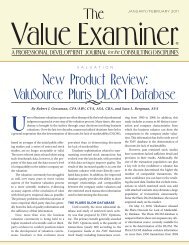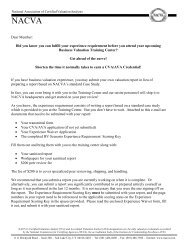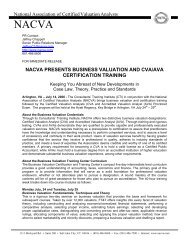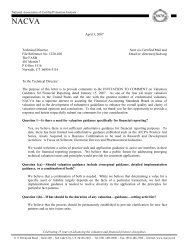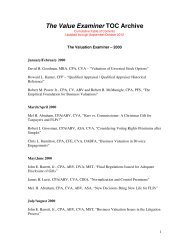VALUATION DISCOUNTS AND PREMIUMS
VALUATION DISCOUNTS AND PREMIUMS
VALUATION DISCOUNTS AND PREMIUMS
Create successful ePaper yourself
Turn your PDF publications into a flip-book with our unique Google optimized e-Paper software.
<strong>VALUATION</strong> <strong>DISCOUNTS</strong> <strong>AND</strong> <strong>PREMIUMS</strong>Fundamentals, Techniques & TheoryMarketability, as a business valuation concept, has been defined a number of ways in businessvaluation treatises. Dr. Shannon Pratt et al define marketability as:“The ability to convert the business ownership interest (at whatever ownership level) tocash quickly, with minimum transaction and administrative costs in so doing and with ahigh degree of certainty of realizing the expected amount of net proceeds.” 5Another definition can be found in the Encyclopedia of Banking and Finance 6 where marketability isfound to connote the existence of a buying interest and a selling interest and is indicated by theaverage daily volume of current transactions and the size of the bid-ask spread. The smaller the sizeof the spread (e.g., the smaller the mark-up demanded by the market maker) the more active is themarket for the underlying security. Alternatively, the more infrequently an equity interest is traded,the larger the bid-ask spread.While privately held business interests never have a “market maker,” except, perhaps, the ultimatebusiness broker, the general concept accorded the bid-ask theory is equally applicable to theseinterests. Investors are risk averse and will prefer investment holdings that can easily be convertedinto cash. Investment holdings lacking this attribute will almost always trade for less. Thedifference in trading value is that specific equity interest’s discount for lack of marketability.Quantification of the discount for lack of marketability is an arduous task, even for the mostseasoned of valuation professionals. A great amount of research has been developed over the lastfour decades in an attempt to quantify the phenomenon of illiquidity as it applies to a specificinvestment. However, valuators continue to struggle with the reconciliation of the available researchto the attendant equity interest under valuation. A logical path from the research to the ultimatediscount selected is imperative to attain the proper conclusion of value.Internal Revenue Service PositionThe Internal Revenue Service addressed the issue of discounts for lack of marketability in RevenueRuling 77-287, stating:“Securities traded on a public market generally are worth more to investors than thosethat are not traded on a public market.”The Internal Revenue Service Valuation Training for Appeals Officers, 1998 page 4-9, lists twoprimary court cases as the basis for discounts for lack of marketability.In Central Trust Co. v. United States, 305 F 2d 292 (Ct. Cl., 1962) the Court of Claims stated:“It seems clear, however, that an unlisted closely held stock of a corporation, in whichtrading is infrequent and which therefore lacks marketability, is less attractive than asimilar stock which is listed on an exchange and has ready access to the investing public.”The courts have followed this principle. This discount is meant to act as a means of equalizing aninvestment in closely held stock with an investment in publicly traded stock. All other attributesbeing similar, the only resulting issue from not being traded on a public market is marketability orliquidity.5 Valuing a Business, Fourth Edition. Shannon P. Pratt, Robert F. Reilly and Robert P. Schweihs. P. 266Encyclopedia of Banking & Finance, Tenth Edition, Charles J. Woelfel, p. 729.18 – Chapter Seven © 1995–2011 by National Association of Certified Valuators and Analysts (NACVA). All rights reserved.2012.v1 Used by Institute of Business Appraisers with permission of NACVA for limited purpose of collaborative training.



